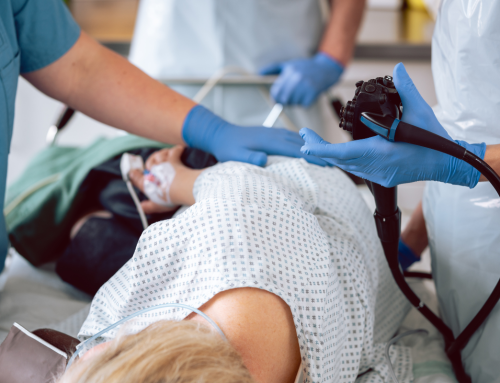After you’re diagnosed with colon cancer, what comes next?
Receiving a cancer diagnosis can be incredibly hard to take. It can be overwhelming to think about your next steps. What comes next? Do I need surgery right away? How will my colon cancer be treated? Is chemotherapy my only option for treatment?
It’s natural to have questions about how to tackle a colon cancer diagnosis.
In this video, Dr. O’Connor explains the process of treating colon cancer from her conversation with Nurse Alice Benjamin and Dr. Scott Metcalfe.
Transcription
Dr. Lynn O’Connor: You get to the point where you get diagnosed. “I have it, now what?” That patient would usually go to Dr. Metcalfe and have what we call a CEA level, carcinoembryonic antigen level, it’s a blood test. And we do that level on the base line because once we treat the patient, that level should go down. It’s not specific for colorectal cancer because there are other things that can increase your CEA level but most times if you have an elevated level, you treating it and it goes down. It goes down, and determines that the baseline going forward whether or not the patient can have a recurrence.
Once they get their CEA level they need to go for a CAT Scan. CAT Scan shows whether or not it’s spread to other organs like we talked about. After they have their CAT Scan, they’ve had their CEA level, they know the results of the colonoscopy, they need to get clearance. And that’s when they would go again to Dr. Metcalfe, their primary care physician, to make sure they’re stable enough for surgery. They get an EKG, they get a chest X-ray, they get their blood work done to make sure they’re hearty enough for surgery.
Then they would go to the hospital and the hospital would do pre-admission testing. Some of the same tests just to check off the boxes to make sure everything is done. And that’s the point where the patient goes home. They have to prep again for surgery. When you’re looking at surgery there are many options to do depending upon what part of the colon is involved and if something has spread.
For patients who have advanced disease, we generally treat them with chemotherapy. But if they do have advanced localized disease we can usually do surgery as well as removal of that isolated lobe of the liver. The majority of the time, they go in for surgery. I try to do my surgeries minimally-invasive and laparoscopic because it’s a shorter hospitalization stay, it’s quicker recovery, there’s a better cosmetic result and patients do well. They get out of the hospital sooner.
There are some times where you have to have open surgery where you have a large incision. Most hospitalization stays are usually about three days for laparoscopic. They’re out of bed, they’re eating the same night of surgery, they’re walking around. As long as their vital signs are stable, their labs are normal, they do well after surgery, they’re home.




